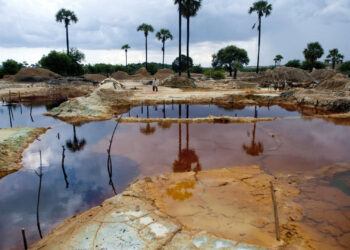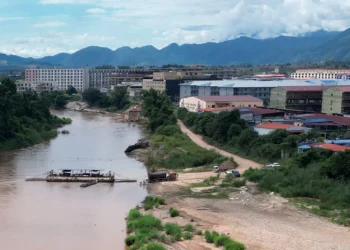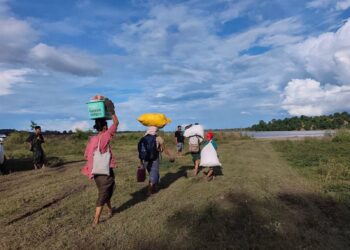Women human rights defenders (WHRD) of Burma/Myanmar are calling on the military junta to return all troops to their barracks and release all detainees and for the UNSC to impose a global arms embargo immediately. Speaking from decades of experience and with representatives around the country, Women’s League of Burma, (WLB) representatives urged foreign investors to halt payments to the regime immediately as any finance the junta receives will be spent on arms to be used against civilians.
The biggest challenge women human rights defenders face is that the government is acting with impunity against anyone who challenges their authority said one WLB representative as she called on the international community to reject the military regime’s 1 February coup. The international community must impose targeted sanctions immediately and ensure neighbouring governments allow cross-border humanitarian aid, said another.
In a webinar hosted by the Asia Pacific Forum on Women, Law and Development (APWLD), Women’s League of Burma (WLB) representatives provided updates on WHRDs throughout Burma/Myanmar during the post-1 February coup crackdown. They focused on WHRDs personal insecurity; increased insecurity of their communities, particularly escalating conflict, and displacement in multi-ethnic areas and what the international community can to pressure the military regime to stop violence and instate genuine democratic rule.
Females on the Frontline
WHRDs around the country are being targeted and criminalized in the current political crisis, stated WLB’s Secretary General. They are being persecuted for exercising their rights, including freedom of expression, by organizing and participating in the protests and civil disobedience movement (CDM) against the coup. Consequently, many WHRDs have gone into hiding.
An estimated 60% unarmed protestors are women. At least 42 women and girls have been killed during armed forces crackdowns. Gender-specific violence is a serious threat to WHRSs on the ground who also face gender-based violence when detained and interrogated. Thirty-five women activists have been arrested in Shan State said a Shan Women’s Action Network (SWAN) representative.
As civil society actors with community and national-level profiles, many WHRDs are known to the military regime. Since the coup they have become targets for arbitrary arrest because of their leadership roles in civil society.
Despite the chaos of the crackdown, WHRDs continue their work including documenting gendered dimensions of post-coup violence. Many reports tell of the deterioration of women’s safety including sexual violence in areas of increased Tatmadaw presence. Additionally, women are grieving the loss of children and family members and enduring increasing burdens of health care as access to hospitals and health care professionals diminishes.
Significantly, WHRDs’ work to document and share information has become increasingly crucial for coordinated emergency responses and the possibility of justice in the future. At the same time, it is increasingly dangerous. Constant internet and mobile phone cuts intensify these challenges.
There is no safety for many WHRDs who risk their safety pursing their human rights work during the day and are hunted by Tatmadaw soldiers and police at night.
Double Whammy of Post-Coup Violence in Conflict-Affected Ethnic Areas
WHRDs in multi-ethnic and borderland areas are experiencing a ‘double whammy’ of intensifying ethno-political conflict and anti-coup crackdowns on top of the on-going civil war and militarisation suffered long by civilians in their areas. For them, the coup is not the re-ignition of violent and gendered political repression but its continuation and escalation.
‘In a country that has experienced conflict for over 70 years of civil war, the abuse of power by the military is nothing new, especially for ethnic people who have been oppressed by the state for years,’ said WLB’s Secretary General. A 2017 report released by the UN’s Myanmar office stated 241,000 internally displaced people (IDP) and refugees in and from Kachin, Shan, Karen, and Rakhine states, with 77% being women and children. In 2017, a further 600,000 Rohingya were displaced during attacks amounting to genocide.
In protest areas in Kachin state, reported a Kachin Women’s Association-Thailand (KWAT) member, police and military forces are shooting protestors, have killed 50 people in urban areas and are looting and burning houses. In Shan state, reported the SWAN representative, Tatmadaw soldiers are carrying dead bodies away in trucks and burning them. Moreover, many more citizens have been arrested than has being officially recorded making numbers of detained much higher than reported.
In rural areas, fighting between the junta and Ethnic Armed Organisations (EAO) has increased. As a result, the junta is moving even more troops into these regions. When the Tatmadaw attacks the EAOs, they attack the civilians at the same time. ‘Civilians are caught in the cross-fire again and again,’ explained the SWAN representative, ‘every time there is fighting the civilians have to leave their villages to newly established IDP camps.’
As a result, human rights violations are escalating including villagers being killed and wounded, farming disrupted, land grabbing, civilians being used as human shields by Tatmadaw troops and thousands of civilians being newly displaced.
Starting 27 March, the Tatmadaw began air strikes in Karen areas, a form of attack not experienced in 20 years. Using air and land assaults, the Tatmadaw has attacked an estimated 300 townships, killing 14 people, injuring 40, according to a Karen Women’s Organisation (KWO) representative.
Across Karen, Shan and Kachin states, an estimated 20 000 people have been displaced from their homes. In additions, multi-ethnic areas under EAO control are receiving and protecting civilians, including protestors and others targeted by the Tatmadaw.
WHRD worry about their people, other women human rights defenders and protestors as they monitor and respond to their communities’ emergency needs and advocate for strong international responses. In extremely difficult and complex situations, ‘we are facing a lot of trouble and insecurity day and night,’ explained the KWAT representative.
IDPs in Shan, Karen and Kachin States
With decades of experience, WLB’s member organizations are working with community members displaced from their homes in precarious situations in Kachin, Shan and Karen states.
Immediately after air strikes in Karen state, thousands of villagers hid in the jungle with many making their way spread along the Karen-Thailand border. 2000 villagers who crossed the interstate border at Salween River were immediately turned back by Thai soldiers. Additionally, the Thai army has blocked cross-border humanitarian aid.
Many thousands more remain hiding from air strikes in the jungle. ‘Children, the sick and the elderly, they are exhausted and tired and afraid. But they have no choice, so they hide under rocks, on the mountain or dig holes,’ explained the KWO representative.
Civilians displaced in Kachin State are also displaced into life-threatening situations without access to proper shelter, food or health care. Prevented from reaching Kachin IDP camps by the Tatmadaw’s northern commander, they cannot return to their villages because of on-going fighting. Additionally, this region is experiencing very heavy rain.
Many are seeking shelter with church communities, however, humanitarian aid to IDPs is also being blocked by the military,’ explained KWAT’s representative. IDP camps existing before the coup also face intensifying difficulties including food shortages.
In Shan State the situation is also dire. Thousands have been displaced from their homes and villages by EAO-Tatmadaw fighting leaving their villages and are establishing new IDP camps. An estimated 5-6000 Shan civilians reached the Shan-Thailand border which has been closed by the Thais because of Covid and now have nowhere to go reported the SWAN representative.
All WLB representatives urged the international community and the Thai authorities to support IDPs and refugees through providing humanitarian assistance and facilitating its cross-border passage to those in need. KWAT’s representative warned that humanitarian aid must be closely monitored and to ensure it reaches the people for whom it is intended.
Transition Period Not Equally beneficial for All in Myanmar
Looking for a silver lining in the crisis, SWAN’s representative noted the growing awareness amongst many in Bamar dominated areas of decades-long ethno-political civil wars and the atrocity crimes committed in these areas. This includes a growing awareness that the period of democratic transition was not a hopeful experience felt in many multi-ethnic areas.
In particular, WLB representatives pointed to atrocity crimes against the Rohingya, exploitation of jade, gold and mineral rich resources by the military and related conflicts and the breakdown of ceasefire agreements and renewed civil war.
Genuine Federal Union of Myanmar to Address Root Causes of conflict
Growing awareness of the multi-ethnic communities’ struggles has clarified the goal of a federal democratic union amongst anti-coup protestors. ‘The common goal is much clearer – a federal democracy union – this has come out very clearly through the calls that people make,’ stated SWAN’s representative.
‘As women’s organisations, we have been trying to have a federal democracy for 20 years, so this is a very important time. And the only way to achieve this is with the CRPH,’ another WLB representative explained. ‘An inclusive CRPH process with women’s and youth organizations – all should be involved.’
Clear Calls for Action
APWLD and WLB have come together to call for specific, collective, and coordinated action by the international community to work to achieve three things: firstly, to stop the violence perpetrated by the military regime against civilians exercising their basic rights to peaceful assembly, they call for the immediate dispatch of a dispatch a well-equipped monitoring and intervention mission.
Second, to deny the military junta the means to attack the civilian population, they call for a comprehensive global arms embargo to end the direct and indirect supply sale or transfer of all weapons and other military equipment that may be used for training, intelligence, and military assistance.
Third, they call for the referral of military coup council members and personnel to the ICC for their mass atrocities against peaceful protesters, ethnic Kachin, Karen, Shan, Rohingya, Rakhine and other civilians.
Source – Mizzima News ( https://mizzima.com/article/insecurity-conflict-affecting-womens-human-rights-defenders )






